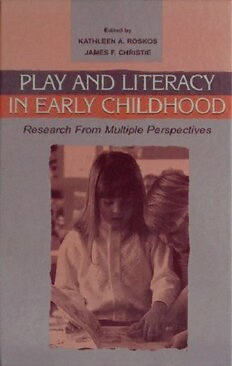
Play and literacy in early childhood: research from multiple perspectives PDF
02000·0.844 MB·English
Most books are stored in the elastic cloud where traffic is expensive. For this reason, we have a limit on daily download.
Preview Play and literacy in early childhood: research from multiple perspectives
Description:
This volume brings together studies, research syntheses, and critical commentaries that examine play-literacy relationships from cognitive, ecological, and cultural perspectives. The cognitive view focuses on mental processes that appear to link play and literacy activities; the ecological stance examines opportunities to engage in literacy-related play in specific environments; and the social-cultural position stresses the interface between the literacy and play cultures of home, community, and the school. Examining play from these diverse perspectives provides a multidimensional view that deepens understanding and opens up new avenues for research and educational practice. Each set of chapters is followed by a critical review by a distinguished play scholar. These commentaries' focus is to hold research on play and literacy up to scrutiny in terms of scientific significance, methodology, and utility for practice. A Foreword by Margaret Meek situates these studies in the context of current trends in literacy learning and instruction. Earlier studies on the role of play in early literacy acquisition provided considerable information about the types of reading and writing activities that children engage in during play and how this literacy play is affected by variables such as props, peers, and adults. However, they did not deal extensively, as this book does, with the functional significance of play in the literacy development of individual children. This volume pushes the study of play and literacy into new areas. It is indispensable reading for researchers and graduate students in the fields of early childhood education and early literacy development.
See more
The list of books you might like
Most books are stored in the elastic cloud where traffic is expensive. For this reason, we have a limit on daily download.
